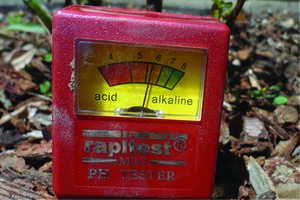Soil pH

pH refers to the measure of Potential Hydrogen in soil.
The pH of soil will show how sweet (alkaline) or sour (acidic) the soil in the tested area is. Soil pH ranges from 1 to 14, with each point changed equivalent to a tenfold increase or decrease. Below 7 means that the soil is acidic, while above 7 means that the soil is alkaline.
The pH will determine the amount of nutrients that are available to plants. At both ends of the pH, either or low, the nutrients are either toxic or won't be released from the soil.
Evaluating pH results[edit | edit source]
The results from store-bought pH tests often are so far off that acting based off of what they tell you can kill your lawn/plants. It is probably best to have your soil professionally tested, which should only cost about $35 [Ed: in which country?] (cheaper than the most of the basic store-bought pH meters that will do any good).[verification needed]
Preferred pH levels[edit | edit source]
The majority of plants prefer a neutral soil pH. This can be achieved by making soil amendments (see below). Some of the preferences for plants are listed here:
- Lawn: For a lawn, a pH of 6.2 to 6.9 means to relax.
- Grass: Grass favors a pH of about 6.5 - and you are in the zone!
If your soil's pH is 5.9 to 6.1 or 7.0 to 7.2, adjusting the pH will noticeably help, but in some cases, it may be best to let it go and let nature take care of what is needed within this range.
Using soil amendments to neutralize the soil pH[edit | edit source]
This is a good time to point out that compost is the great neutralizer. No matter what your current pH, compost brings your pH closer to optimal. Other well rotted organic matter is also very helpful.
In general, lime and wood ash are used to raise pH (make more alkaline), and gardener's sulfur and peat moss are used to lower it (make more acidic).
Amendment of limestone soils is difficult and may not work using organic additions. Use plenty of organic matter along with some organically certified iron chelate to give the plants a good chance of avoiding iron deficiencies in limestone soils.
Before adding any soil amendment, be sure to look into how to properly apply these materials first. If you're not having any luck adding amendments or you don't wish to go to this trouble, choose plants suited to the soil type that you do have instead.
Checking for pH[edit | edit source]
For guidelines on how to check your soil pH, change your soil pH, and for a chart of optimal pH for various plants, visit: soil pH stuff at richsoil.com, or check out pH forum thread at permies.com.